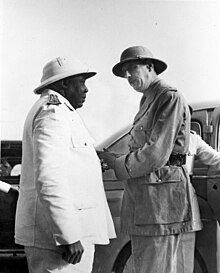Félix Éboué
Félix Éboué (December 1885 in Cayenne , French Guiana , † May 17, 1944 in Cairo , Egypt ) was a French colonial politician .
Life
Éboué came from French Guiana. His grandparents were still slaves . Félix Éboué was the second youngest of five sons of Yves Urbain Éboué and Marie Josephine Aurélie Leveillé. The assimilation policy and a scholarship enabled the talented pupil to attend school in Bordeaux . In addition to his academic achievements, he excelled as the captain of a successful soccer team.
After studying at the École coloniale in Paris , Éboué entered the French colonial administration. After many years in Ubangi-Shari , today's Central African Republic , he became Secretary General in the administration of Martinique in 1932 . From 1934 he filled the same post in French Sudan . In 1936 Éboué became governor of Guadeloupe , where he organized the first free elections. This made him the second black man after Louis Blacher to receive a post as governor in the French colonial administration. In 1939 he moved to Chad as governor .
On August 26, 1940, he was the first governor of a French colony to submit to Charles de Gaulle's government in exile. This appointed Éboué Governor General of all of French Equatorial Africa . In this position he promoted locals as functionaries of the colonial administration. In November 1941 he published a "New Native Policy" program. In it he propagated a new administrative model for the colonies, which should include the African chieftain tradition as well as the local elite. This program was implemented during the Second World War . Éboué was made an officer of the Legion of Honor and awarded the Ordre de la Liberation on January 29, 1941 .
Félix Éboué died of a heart attack while on a business trip in Cairo . By decision of the National Assembly, his remains were transferred to the Panthéon together with those of Victor Schœlcher on May 20, 1949 and buried in an honorary grave. He is the first black man to be honored in this way in France. The Place Félix-Éboué in the 12th arrondissement of Paris and the airport in Cayenne , French Guiana , bear his name.
In 1946 his daughter married Léopold Sédar Senghor , who later became President of Senegal .
literature
- Albert M'Paka: Félix Éboué (1884–1944), Governor Général de l'Afrique Equatorial Française, Premier Résistant de l'Empire. Grand Français, Grand Africain. L'Harmattan, Paris 2008, ISBN 978-2-29606187-3 .
Web links
- Biography (french)
| personal data | |
|---|---|
| SURNAME | Éboué, Félix |
| BRIEF DESCRIPTION | French colonial politician |
| DATE OF BIRTH | December 1885 |
| PLACE OF BIRTH | Cayenne , French Guiana |
| DATE OF DEATH | May 17, 1944 |
| Place of death | Cairo , Egypt |

